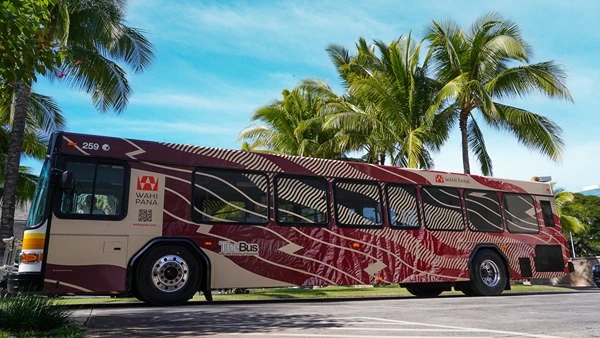Bus fares in Honolulu could get more expensive soon.
The Honolulu City Council is considering a long-in-development proposal to update the city’s bus fare structure, a process which will simplify a range of fare discounts but will also increase most fares across the board.
Under the proposal, a single adult fare, paid in cash, will increase from $3 to $3.25. And while the cost of a HOLO Card two-hour pass or day pass will remain the same — $3 and $7.50, respectively — a HOLO Card monthly pass will increase from $80 to $90, while an annual pass will increase from $880 to $990.
Youth fares will face similar increases. Single cash fares will increase by $0.25, monthly passes will go up from $40 to $45 and annual passes from $440 to $495. As before, two-hour and day passes will cost the same as now.
DTS Director Roger Morton told Aloha State Daily that these hikes are expected to generate about $2 million in additional revenue, which will go to offset the deficit that the transit system typically operates at.
Morton explained that the department’s budget this year is about $430 million, while revenue from passengers is only $50 million. While he said that this is “a large delta,” he added that most municipal transit systems operate at a deficit.
The $0.25 cost increase for cash fares is intended to disincentivize the use of cash on buses altogether, which Morton said is more expensive for the department to handle. Currently, about $11 million of rider fares come from cash payments.
“Personally, I’d love for that to go down to zero,” Morton said. “Maybe when we’re at a point where nobody uses cash for groceries.”
Morton added that the last bus rate hike was in 2022, which was a similar increase: an adult monthly pass rose from $70 to the current $80, for example.
Meanwhile, the city’s current separate fare structures for senior citizens, passengers with disabilities and paratransit passengers will be merged into a single “reduced fare” category that is also shared by “individuals with extremely low incomes,” a threshold determined by the U.S. Department of Housing and Urban Development.
Morton said this will help reduce “anomalies” in the fare system. For example, he said a person currently enrolled in DTS’ TheHandi-Van service can buy an annual pass for $35, but a person not enrolled but with a disability must pay more.
Broadly speaking, this consolidation also will result in fare increases. Resident senior citizens currently spend $1.25 for single rides and $3 for a daily pass, but are not charged for monthly or annual passes. The new reduced fare tier will charge all eligible users $1.50 for a two-hour pass, $3.75 for a day pass, $20 for a monthly pass and $50 for an annual pass.
Morton guessed that about 100,000 of Honolulu’s current riders are currently eligible for this tier, but added that even more could qualify without knowing it.
The Council voted in support of the bill on first reading Wednesday with little discussion, forwarding it to its first committee hearing.





